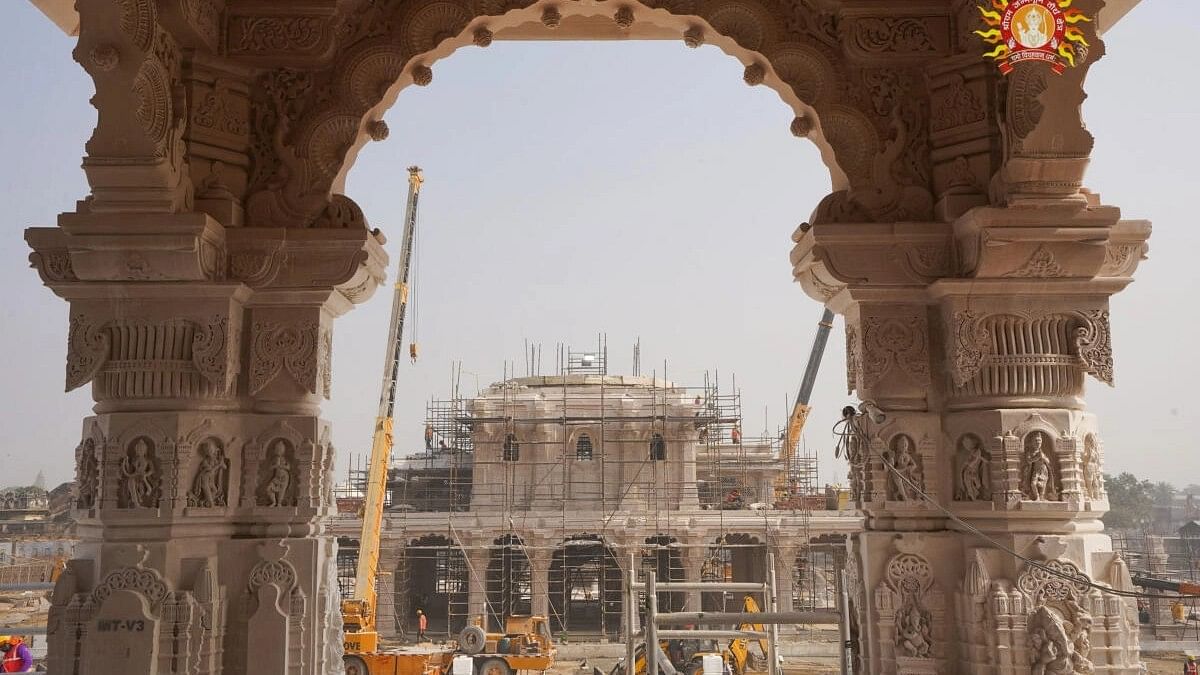
Carvings inside the under-construction Shri Ram Janmabhoomi temple, in Ayodhya.
Credit: PTI Photo
By Shruti Mahajan
As Prime Minister Narendra Modi prepares to open the Ayodhya temple where a centuries-old mosque once stood, Hindu groups have won important court rulings in the past week on other disputed religious sites.
India is making extensive preparations for Modi to inaugurate the Ram temple in Ayodhya on January 22, fulfilling an election promise made by the ruling Bharatiya Janata Party (BJP) to its Hindu voters.
The religious site had been the source of a bitter dispute between Hindus and Muslims for decades and sparked deadly riots in the 1990s after the 16th-century Babri mosque was demolished there.
The Supreme Court in 2019 eventually awarded the land to Hindus, some of whom believe the site is the birthplace of the god Ram.
The Ayodhya case has set a precedent, with Hindu groups laying claim through the courts to two other locations where Mughal-era mosques currently stand.
In the past week the groups have won important court rulings in their favor, developments that help to bolster Modi’s support among Hindu voters just months before a national election, but also potentially heightening religious tensions in the country.
“The Supreme Court’s ruling in the Ayodhya case in 2019 has definitely opened the floodgates for other claims to be made and validated,” said Apoorvanand, a professor at the University of Delhi, who writes about Indian politics and goes by one name.
Hindu groups have petitioned the courts for the removal of the Gyanvapi mosque that stands adjacent to Kashi Vishwanath temple in Varanasi and the Shahi Idgah mosque, which neighbors the Krishna Janmabhoomi temple in Mathura.
Like the Ayodhya case, the litigants claim that the ancient mosques were built on land where Hindu temples once stood.
The latest court developments “privilege the idea of majoritarian will over principles of justice,” Apoorvanand said.
The three temples are in Uttar Pradesh, the province governed by Yogi Adityanath, a firebrand Hindu monk who has spoken out against Muslims.
Modi’s party has invested tens of millions of dollars into building infrastructure near pilgrimage sites, sometimes at a high cost to some residents whose homes and stores are partially razed to make way for projects.
In the Varanasi case, which has been pending for 32 years, the Allahabad High Court on Tuesday ruled against the Muslim side seeking protection of the mosque under existing legislation. The court said the case was of “vital national importance” and cleared the way for hearings to take place.
Last week, the same court allowed for a scientific survey to be carried out at the site of Shahi Idgah mosque in Mathura to determine if it was built over a Hindu temple.
A law from 1991 protects all religious sites in the way they existed on the day India became an independent country in 1947.
The legislation had helped to keep the two court cases suspended and simmering for decades, but the high court’s ruling means the statute is no longer an impediment in the land title dispute.
With the Ayodhya case, the Supreme Court acknowledged evidence of the remains of non-Islamic structures beneath the mosque, but also said that demolishing the mosque was a criminal act.
After that ruling, several right-wing Hindu groups sprung into action to “free the temples” in Mathura and Varanasi, which they believed were destroyed to make way for mosques during the Mughal era. This sentiment was reminiscent of the slogans chanted by Hindu groups — including BJP workers and members of the ruling party’s ideological parent, the nationalist Rashtriya Swayamsevak Sangh — after the demolition of the Babri mosque in 1992.
The messages stoke feelings of historical dispossession among the majority Hindu population, which can cause divisiveness and religious tension, said Apoorvanand.
“All these things are elements of a strategy to create a Hindutva consciousness,” he said, referring to the ideology of Hindu nationalism.